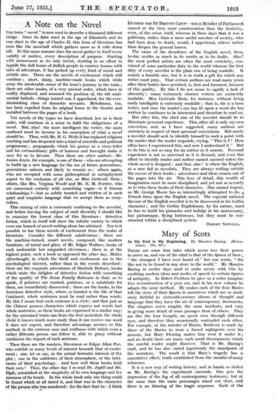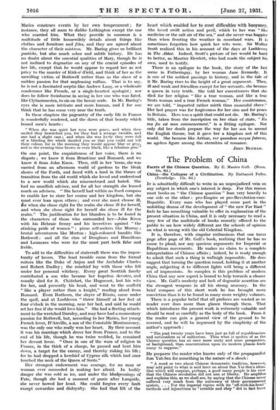Mary of Scots
In My End is My Beginning. By Maurice Baring. (Heine- mann. 10s. 6d.) THERE are some true tales which never lose their power to move us, and one of the chief is that of the Queen of Scot, " the strangest I have ever heard of," her son wrote, " the like not to be found in any story in the world." Mr. Maurice Baring in earlier days used to make merry with Clio by crediting modern ideas and modes of speech to certain figures of antiquity. In Robert Peckham he gave us a sober imagina- tive reconstruction of a past era, and in his new volume he adopts the same method. He makes each of the four Marks tell the story of their Queen in narratives which are so studi- ously faithful to sixteenth-century idioms of thought and language that they have the air of contemporary documents. The chapters cover roughly the same incidents, and vary in giving more detail of some passages than of others. They are like the four Gospels, an epoch seen through different eyes, and therefore they occasionally contradict each other. For example, at the murder of Rizzio, Ruthven is made by three of the Marks to wear a furred nightgown over his armour, but Mary Fleming makes him wear it under it ; and no doubt there are many such small discrepancies which the careful reader might discover. That is Mr. Baring's craft, and he has also varied ingeniously the standpoint of the narrators. The result is that Mary's tragedy has a cumulative effect, truth established from the mouths of many witnesses.
It is a new way. of writing history, and in hands so skilled as Mr. Baring's the experiment succeeds. One gets thc impression of the fog of all contemporary testimony, but at the same time the main personages stand out clear, and there is no blurring of the tragic sequence. Each of the Marks construes events by her own temperament ; for instance, they all seem to dislike Lethington except the one who married him. What they provide in common is a multitude of little housewifely details about things like clothes and furniture and Ides, and they are agreed about the character of their mistress. Mr. Baring gives us brilliant pastiche, but also much sober and subtle history. He has no doubt about the essential qualities of Mary, though he is not inclined to dogmatize on any of the crucial episodes of her life, except that he would appear to regard her as not privy to the murder of Kirk-o'-Field, and think of her as the unwilling victim of Bothwell rather than as the slave of a sudden passion for that unpleasing ruffian. That is to say, he is not a fascinated sceptic like Andrew Lang, or a wholesale condemner like Froude, or a single-hearted apologist ; nor does he follow Swinburne in seeing in her one who was fated, like Clytemnestra, to sin on the heroic scale. In Mr. Baring's eyes she is more intricate and more human, and I for one think that he has come very near the truth.
In these chapters the pageantry of the early life in France is wonderfully rendered, and the dawn of that beauty which bound men's hearts :
" When she was quiet her eyes were grave, and when they smiled they bewitched you, for they had a strange twinkle, and one had a slight cast ; and when she was lively they were full of a blinding fire which ria771ed you so that you could not tell their colour, for in the morning they would appear blue or grey, and in the evening time brown or even black, like a fabulous gem."
On one point, the exquisiteness of her voice, there is no dispute ; we know it from Bmntome and Ronsard, and we know it from John Knox. Then, still in her 'teens, she was carried from an afternoon world of gardens to the bleak shores of the Forth, and faced with a land in the throes of transition from the old world which she loved and understood to a new world which she misconstrued and hated. She had no unselfish adviser, and for all her strength she leaned much on advisers. " She herself had within no fixed compass to enable her to steer her course and her kingdom, but she must ever lean upon others ; and ever she must choose ill, for when she chose right for the realm she chose ill for herself, and when she chose right for herself she chose ill for the realm." The justification for her blunders is to be found in the characters of those who surrounded her—John Knox with his Hebraic frenzy and his invectives against " the stinking pride of women " : pious self-seekers like Murray ; brutal adventurers like Morton : high-coloured bandits like Bothwell : and all the clan of Douglases and Hamiltons and Lennoxes who were for the most part both false and feeble.
To add to the difficulties of statecraft there was the impor- tunity of lovers. The least trouble came from the formal suitors like the Duke of Anjou and the Archduke Charles and Robert Dudley ; the mischief lay with those who fell under her personal witchery. Every great Scottish family contributed a son who became her hopeless devotee, and usually died for it. Chb.telart, the Huguenot, lost his wits for her, and presently his head, and went to the scaffold " like a player rather than a knight," reading aloud from Ronsard. Even Ruthven, the slayer of Rizzio, came under the spell, and at Lochleven " threw himself at her feet at four o'clock in the morning, near her bed, and said he would set her free if she would love him." She had a fleeting attach- ment to the wretched Darnley, and may have had a momentary passion for Bothwell, but, according to her Manes, her young French lover, D'Anville, a son of the Constable Montmorency, was the only one who really won her heart. By their account it was his marriage which drove her from France, and to the end of his life, though he was twice wedded, he remained her devout lover. " Once in one of the wars of religion in France, in the thick of a charge, he paused and bent him down, a target for the enemy, and thereby risking his life ; for he had dropped a kerchief of Cyprus silk which had once
touched the neck of the Queen of Scots."
Her strongest endowment was courage, for no man or woman ever succeeded in making her afraid. In bodily danger she was cold as ice, and under the bludgeonings of Fate, though she had a moment of panic after Langside, she never bowed her head. She could forgive every fault except cowardice and disloyalty. She had that lift of the
heart which enabled her to meet difficulties with buoyancy. She loved swift action and peril, which to her was " like Medicine or the salt air of the sea," and she never was happier than when fronting the weather in moorland wars. It is sometimes forgotten how quick her wits were. Sir Walter Scott realized this in his account of the days at Lochleven in The Abbot. Indeed, Scott's picture of her would be hard to better, as Maurice Hewlett, who had made the subject his own, used to testify.
There is an epilogue to the book, the story of the last scene in Fotheringay, by her woman Jane Kennedy. It is one of the noblest passings in history, and in the tale of it Mr. Baring rises to the height of a great argument. Then, ill and weak and friendless except for her servants, she became a queen in very truth. She told her executioners that she died for her religion " like a true woman, and like a true Scots woman and a true French woman." Her countenance, we are told, " imported rather mirth than mournful cheer." Her last prayer was for forgiveness for her sins and for peace in Britain. Hers was a spirit that could not die. Mr. Baring's title, taken from the inscription on her chair of state, "En ma fin est mon commencement," is a fitting epilogue. Not only did her death prepare the way for her son to ascend the English throne, but it gave her a kingdom not of this world. She became like Arthur, rex quondam rexque futures, an ageless figure among the eternities of romance.
JOHN BUCHAN.







































 Previous page
Previous page